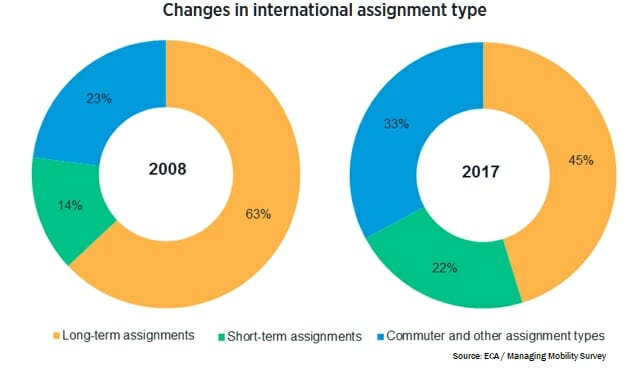The landscape of global mobility is being transformed by the emergence of non-traditional types of expat assignments, such as short-term assignments, frequent business travel and cross-border commuting.
Why have these alternative assignments emerged? First, there is the rise of dual-career couples and other non-traditional family arrangements that make moving more problematic (same-sex couples; families who have children with special needs; expats needing to take care of ageing parents, among others).
This is combined with the pressure for employers to cut costs. Traditional expat assignments are big investments, while the new, shorter-term, types I just mentioned are low-investment, low-commitment and easier to reverse.
Finally, globalization and advances in transportation and communication technologies have made those new kinds of assignments much more feasible.
New mobility types
These forces have led to the emergence of new, new, non-traditional types of assignments, which are especially popular with younger and/or single (therefore more mobile) professionals, as well as in cases where moving the family is problematic:
1. Short-term assignments. Like traditional ones, only shorter, i.e. the employee moves for a period between 1 and 6 months, usually for a short-term project, when a specific skill is needed, or training needs to be provided to the local workforce.
short-term project, when a specific skill is needed, or training needs to be provided to the local workforce.
2. Extended business travel (also called frequent travel, international business travel) where the employee is based in their “home” country and travels frequently to other countries, often for several weeks at a time. Here, I also include what I call the “traveling specialists” or employees that spend a big chunk of their time traveling between different locations, wherever their expertise is needed, or – for example in the case of regional managers or CEOs for a multi-region business – among the sites that they manage.
When we lived in Vienna, my husband was responsible for Eastern Europe, which required him to spend part of his time traveling to and working from Poland, Hungary or the Czech republic.
3. Cross-border commuting, where the employee is based in their “home” country and works in a different country during the week.
At some point in time, my work was based in the Netherlands and I’d commute to Austria – where our home was – every other weekend. At the same time, my husband’s job required him to commute to Germany during the week and return to Vienna for the weekend.
For these non-traditional paths, the partner and/or family stay at home rather than follow abroad.
It’s clear that the world is moving in this direction as the following numbers illustrate:
- Traditional assignments fell from 63% of all assignments in 2008 to 45% in 2017.
- Short-term assignments increased from 14% in 2008 to 22% in 2017.
- Cross-border commuter and other non-traditional assignments increased from 23% to 33%.
These alternative types of assignments bring on different challenges and different needs for support for those undertaking them.
Kinds of support needed
From a quick survey, combined with my own experience, I identified four areas where non-traditional assignees and their families need support. These are:
Immigration & taxation issues — Do they need a visa? Where are they taxed? How do they track the days they spend working in each country? How do they calculate their tax obligations in each country & how do they make sure they have proof where they were & when? (You can get in so much trouble so easily with the days if you’re not careful; you can accumulate liabilities on either or both sides – and it costs)
Financial planning, including questions about pension, social security and insurance coverage. Where are they considered (tax) residents and therefore where are they covered? How do they manage their finances when they live between places?
Practical issues such as: Short-term accommodation (What’s the most efficient choice? Hotel? Airbnb? Rented apartment?); Travel scheduling & other concierge services (Often, travelers they do their own.); Managing health care needs in different locations.
Support for managing their “neither-here-nor-there” lifestyle. This is a big topic that’s also very close to my heart, as I’ve experienced the challenges of leading this lifestyle first-hand – and I’ve done so for years. These new types of assignments are taxing on both the assignee and their partners and families. There are many kinds of non-traditional relocation support that would make a difference here:
- Support with maintaining work-life balance (easy to lose that).
- Support with self-care, including maintaining their physical and emotional wellbeing.
- Support in maintaining connection with their loved ones.
This kind of support would involve services such as coaching, counseling/psychological support, access to virtual assistants etc. Access to a virtual assistant sounds like practical support, but actually it’s about taking the stress off expats and their families, so they have more time for self-care and nurturing relationships.
Something else that my survey highlighted was that most alternative assignments don’t receive specific relocation support because they are not assumed to involve much actual relocation. So, as things stand now, most non-traditional expats and their families have to manage their support needs – logistics, but also managing the emotional side – on their own, with minimal support. Because their needs are not as well understood as those of traditional expats, it’s not uncommon for them to get a lump sum to spend, rather than specific relocation support. But as we’ve seen, that does not mean that their support needs are any less significant than those of traditional expats.
